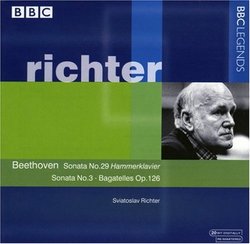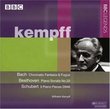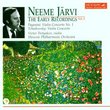| All Artists: Ludwig van Beethoven, Sviatoslav Richter Title: Beethoven: Soantas Nos. 29 "Hammerklavier" & 3; Bagatelles Op. 126 Members Wishing: 1 Total Copies: 0 Label: BBC Legends Original Release Date: 1/1/1975 Re-Release Date: 11/14/2000 Album Type: Original recording remastered Genre: Classical Styles: Chamber Music, Forms & Genres, Sonatas, Historical Periods, Classical (c.1770-1830), Modern, 20th, & 21st Century, Romantic (c.1820-1910) Number of Discs: 1 SwapaCD Credits: 1 UPC: 684911405224 |
Search - Ludwig van Beethoven, Sviatoslav Richter :: Beethoven: Soantas Nos. 29 "Hammerklavier" & 3; Bagatelles Op. 126
 | Ludwig van Beethoven, Sviatoslav Richter Beethoven: Soantas Nos. 29 "Hammerklavier" & 3; Bagatelles Op. 126 Genre: Classical
Sviatoslav Richter was devoted to Beethoven and kept nearly two dozen of the composer's 32 sonatas in his active repertory. But some sonatas--such as No. 3 in C Major (Opus 2, No. 3), No. 7 in D Major (Opus 10, No. 3), and... more » |
Larger Image |
CD DetailsSynopsis
Amazon.com Sviatoslav Richter was devoted to Beethoven and kept nearly two dozen of the composer's 32 sonatas in his active repertory. But some sonatas--such as No. 3 in C Major (Opus 2, No. 3), No. 7 in D Major (Opus 10, No. 3), and No. 32 in C Minor (Opus 111)--turned up on Richter programs decade after decade, while others appeared for a season or so never to return. Richter's relationship to Sonata No. 29 in B-flat (Hammerklavier) belongs to the latter category. He performed it all over Europe in the spring and summer of 1975 and seems never to have programmed it again. One wonders why. Richter was designed by God to perform the Hammerklavier. He had the huge hands necessary for its reckless leaps, the strength and stamina for its marathon length, and the intellect necessary to make lucid its grinding dissonance and (in the finale) its pounding counterpoint. Perhaps Richter thought that at 60--his age when he began to program it--he was a little too old for the Hammerklavier. Certainly, even a Richter enthusiast can be forgiven for wishing the pianist had turned to the piece 10 years earlier. Still, the pianist's Hammerklavier is heroically grand and fiercely energetic. Of the three performances of the sonata that Richter gave in a two-week period (and that have been preserved on disc) in London, Prague, and Aldeburgh (this disc), this recording is probably best-suited to most listeners. While not as exciting as the risk-taking Prague performance, it is much better recorded and more accurate. It also contains several bonuses: beautifully played versions of Beethoven's Sonata No. 3 and of three bagatelles from the composer's Opus 126. --Stephen Wigler Similar CDs
|
CD ReviewsA Stupendous Hammerklavier Jeffrey Lipscomb | Sacramento, CA United States | 05/20/2005 (5 out of 5 stars) "This live 1975 Beethoven recital contains Richter accounts of the early Sonata #3, the Bagatelles Opus 126 (just #1, 4 & 6) and, the star attraction, the "Hammerklavier" (Sonata #29). This program competes directly with Richter's live Prague accounts of the same works (in a deleted 15-disc Praga CD set). Here are some impressions based on listening to both performances, plus those by a few other pianists. The Sonata #3 for BBC, to my taste, is played with a percussive severity that borders on excessive. The Prague is just a shade gentler and more to my liking (both are superb). The latter is played with the first mvt. repeat, whereas the BBC omits it. Richter was a zealot when it came to repeats, and I suspect that BBC has simply excised the repeat here to squeeze the program (which runs 77:45 as is) on to a single CD. Frankly, I feel that's a highly questionable aesthetic decision (IMG did a similar editing job on a Beethoven symphony in their volume dedicated to Furtwangler). My other favorite performances of this work are Wilhelm Kempff's small-scale pointillistic account (mono DG), the Claudio Arrau on Philips LP (particularly for the intense depth of his slow mvt.), Artur Schnabel (mine's on a Dante CD set - it is similar in its bold projection to Richter's), and the Yves Nat on EMI (an under-rated complete set in mono that has an amazing variety of subtlety and nuance). Richter's BBC & Praga accounts of 3 Bagatelles from Op. 126 are pretty similar - all in all, I find a little more interpretive fire in the Praga. Both are among my all-time favorite readings, though I don't feel that Richter or anyone else quite matches the rich wisdom and total coherence of Schnabel's aged mono account of all six. That brings us to the Hammerklavier, the most fiendishly-difficult Sonata to interpret ever written by Beethoven (or anyone else, for that matter). The composer's original metronome markings in the outer movements are incredibly fast, while the extraordinary Adagio - of almost Brucknerian dimensions - requires an enormous reservoir of deeply-felt emotion. I suspect that the "perfect" Hammerklavier has never been recorded and probably never will. The first of those to try plunging head-long into it at the specified fast tempo was Schnabel, and he misses almost as many notes as he hits. Two accounts that achieved rapid tempo success where Schnabel failed are both on out of print LPs: Beveridge Webster (Dover) and Charles Rosen (Epic), while Rudolph Serkin came close (Sony). But all three turned in fast and rather chilly readings of the Adagio, which Schnabel did sublimely (as did Kempff in his mono DG set). Solomon Cuttner (mine's on Odeon LP) was sure-fingered throughout his reading, but somehow his interpretation strikes me as just a little too smooth and sophisticated (others feel very differently). So where does that leave this Richter account, performed just a week after the live one in Prague? Together, they represent the most stupendous LIVE performances in my experience. Both times, Richter adopts a moderate tempo in the first mvt., his 2nd mvt. is alive with rhythmic flexibility, and the final mvt. is almost over-powering in its torrential virtuosity. But there are differences, too. In the Prague, things come almost un-glued for just a second or two (around 8:20 into it), while no such mishap occurs in Aldeburgh. The shortcoming to both Richters for me is the slow mvt., which lacks slightly the tear-choked quality of Schnabel (the Praga comes perhaps a little closer than the BBC). And the recorded sound is quite different in Richter's two versions: BBC is more distant and slightly more clangorous, while the Prague is more close-up and personal (I prefer the latter's sound over-all). Both of these extraordinary performances of the most challenging sonata ever written are ESSENTIAL listening. In my own personal pantheon, they join the Schnabel (Adagio only), the mono Kempff (perhaps the best Adagio after Schnabel's), the iconoclastic and hugely-dimensioned Ernst Levy (Marston), and the more intimate and smaller-scale Yves Nat. I'm sure there are other great accounts out there, but you can't go wrong with any of these. Highly recommended." WHEN ICONS COLLIDE DAVID BRYSON | Glossop Derbyshire England | 10/20/2001 (4 out of 5 stars) "I like and admire Richter hugely. This is a live recital from Blythburgh church in Suffolk, and the sense of human warmth that pervades it is something for the heart -- whatever my head tells me about his Hammerklavier.Richter's account of the sonata op 2#3 is not as polished as from Gilels or Michelangeli, but I can frankly live without the icy detachment of Gilels in this piece, though not without the above-it-all imperiousness of Michelangeli or the effortless spontaneity of Richter. I'm not sure he is perfectly attuned to the moody and volatile Beethoven of the Bagatelles, but he gets near enough for me to enjoy them. Which leaves the Hammerklavier. To start with the best, the last movement is splendid -- big, rough and commanding. I like his unusually low-voltage scherzo too, except that the dog-shaking-itself tremolo following the trio doesn't seem to mean much to him. Most of the first movement is fine also. He has the sheer size for it. He does not bring the roof down with the opening chords as Serkin does. I wish he had, but then again Serkin was unique, and maybe Richter was wiser to leave that particular effect to him. What bothers me more is that there is so little 'expressive' music in this movement that I wish Richter had made more of it. The 'arching' theme starting with the rising octave followed by a falling arpeggio is a bit businesslike, and, more seriously, in the heavenly running duet between the hands he misses the significance of the left-hand part altogether. Just listen to Serkin play both these sequences to hear what I mean.The Adagio is a real interpretative crux. I learned decades ago to admire Solomon here -- quiet, rapt and very slow. Richter is in the same mould, so I, like many, was disconcerted by Serkin with his faster tempo, stronger tone-contrasts, more sparing use of pianissimo and absence of pedal in the wonderful florid transition-theme. Whether Serkin or anyone else has said the last word about this strange fathomless movement I doubt, but a closer look at the score suggests two things to me -- even where the player has the iconic stature of Richter, he will not plumb the genuine depths of the more iconic Beethoven by playing pianissimo where it is not marked or by equating 'una corda' with it -- it is up to Beethoven to decide whether an almost-but-not-quite-slow-waltz is an appropriate accompaniment to to the marvellous transition-theme, not up to the player to obliterate the effect with pedal. B. went to great pains to indicate that these chords are to be played short. And while a dead-slow tempo at the start may give an air of spirituality, to follow it with a jolting gear-change at the transition, as Richter and Solomon do, makes me think it was too slow to start with.There's an interesting textual point at the reprise of the first movement main theme. The note that leads back the theme is played by Richter and everyone else I can recall -- except one --as A sharp. Beethoven actually wrote A natural, though frankly I prefer A sharp. Guess who the one is who plays what Beethoven wrote." Another important release! G. Dillard | New York City | 11/21/2000 (5 out of 5 stars) "BBC Legends continues to open wide a treasure-chest of some of classical music's greatest recordings! This release is among the best. The sound quality allows you to hear just how amazing Richter's playing really is! The "Hammerklavier" has appeared on several overseas labels, but we get a "bargain" here with other selections from this outstanding Beetoven recital given in a Church. Check out Beetoven's 2nd sonata! It was one of Michaelangeli's favorite recital pices, but even his mercurial playing of the work does not surpass Richter's amazing performance! Also included are a set of beatifully performed "Bagtelles" and one of the greatest interpretations of the "Hammerklavier" ever performed or recorded! The CD is a "must-have" for any Richter fan as well as any fan of classical music for the piano! ENJOY!"
|

 Track Listings (11) - Disc #1
Track Listings (11) - Disc #1


